Lcd companion boards support (VKLCD50RTA & VKLCD70RT)
What is this ?
This is a demo program using Renesas RGA library & USB Camera to demonstrate VK-RZ/A1H's companion boards workability.
Supported companion Boards:
VKLCD50RTA
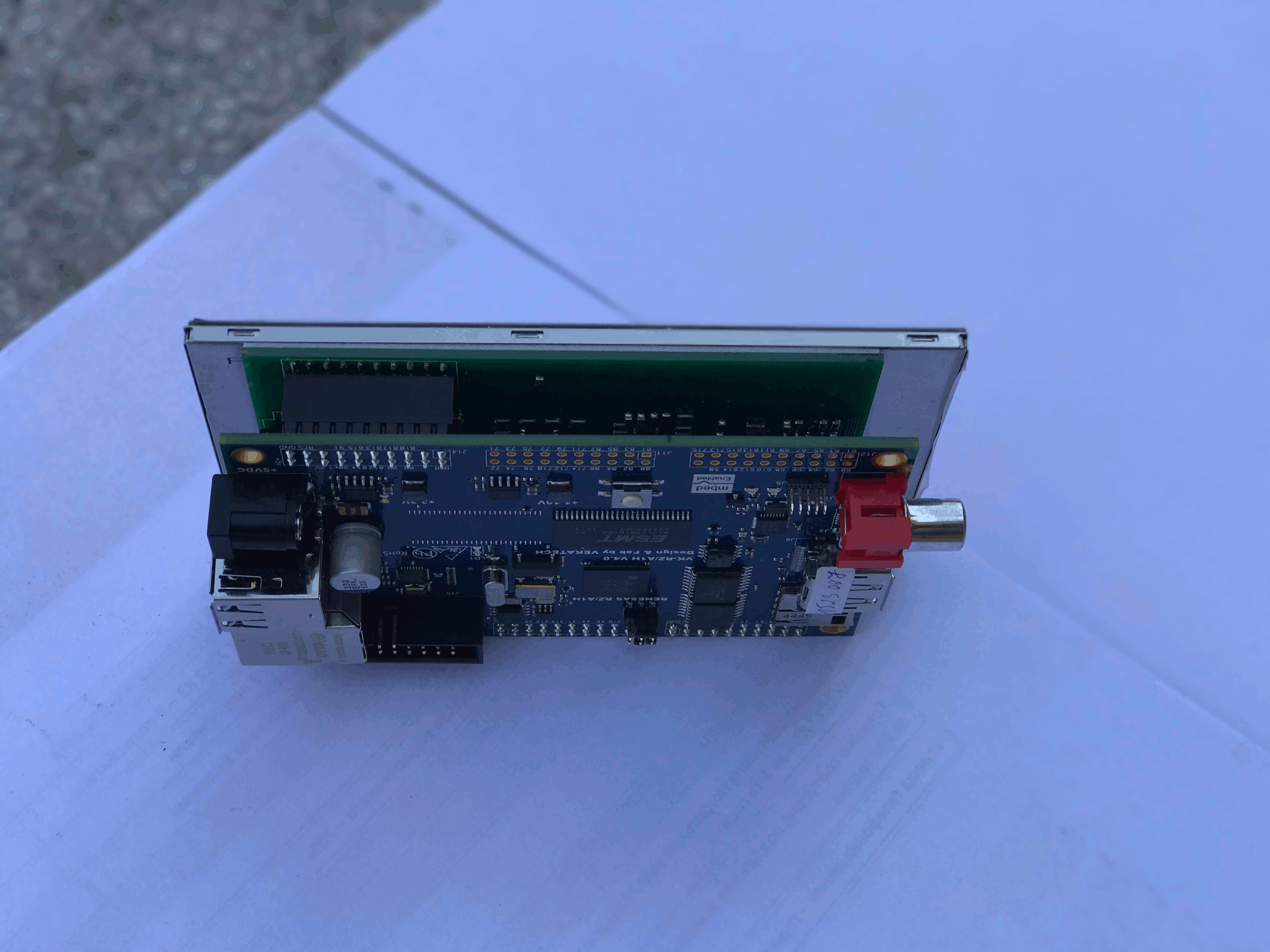
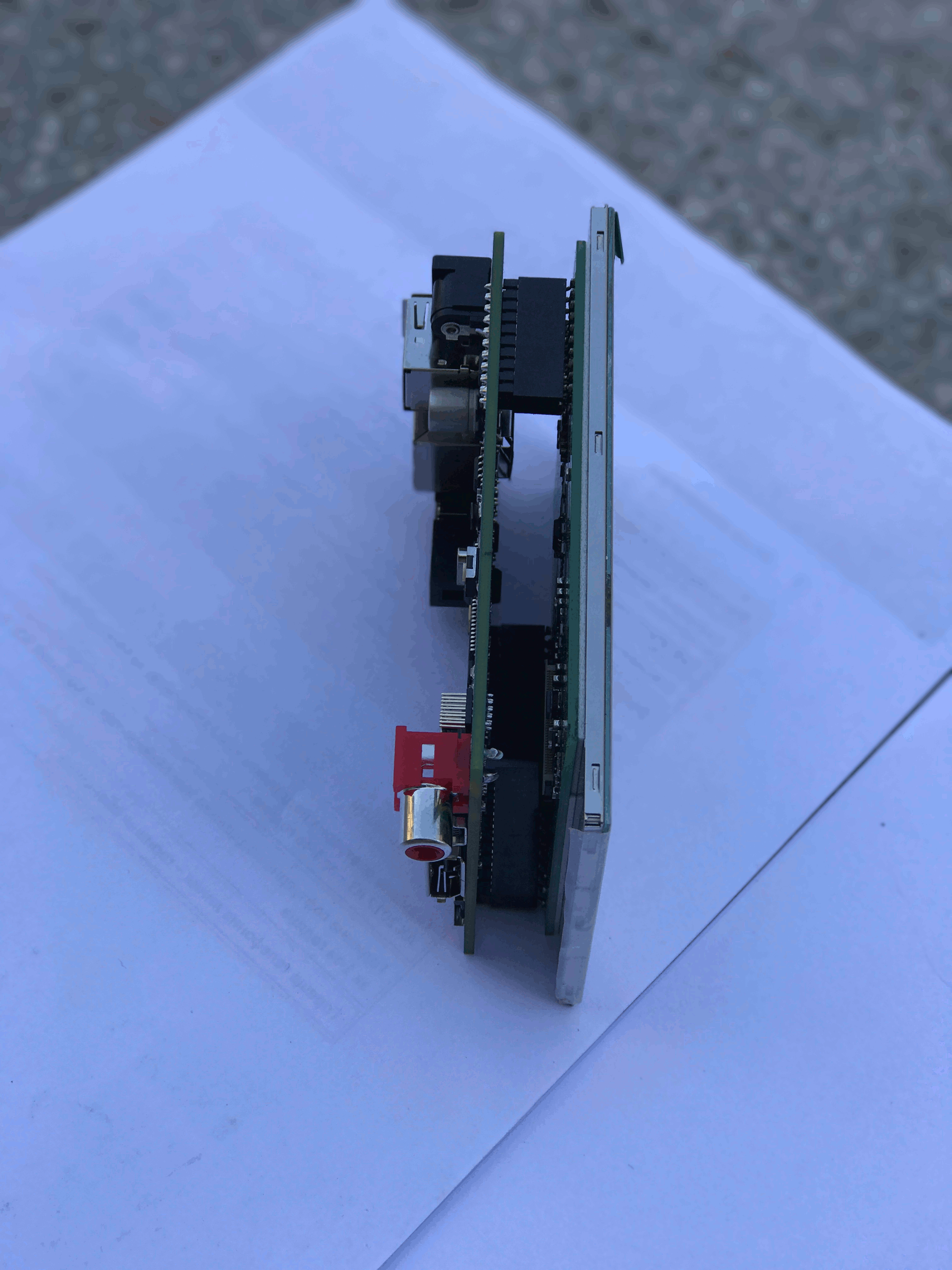
VKLCD70RT
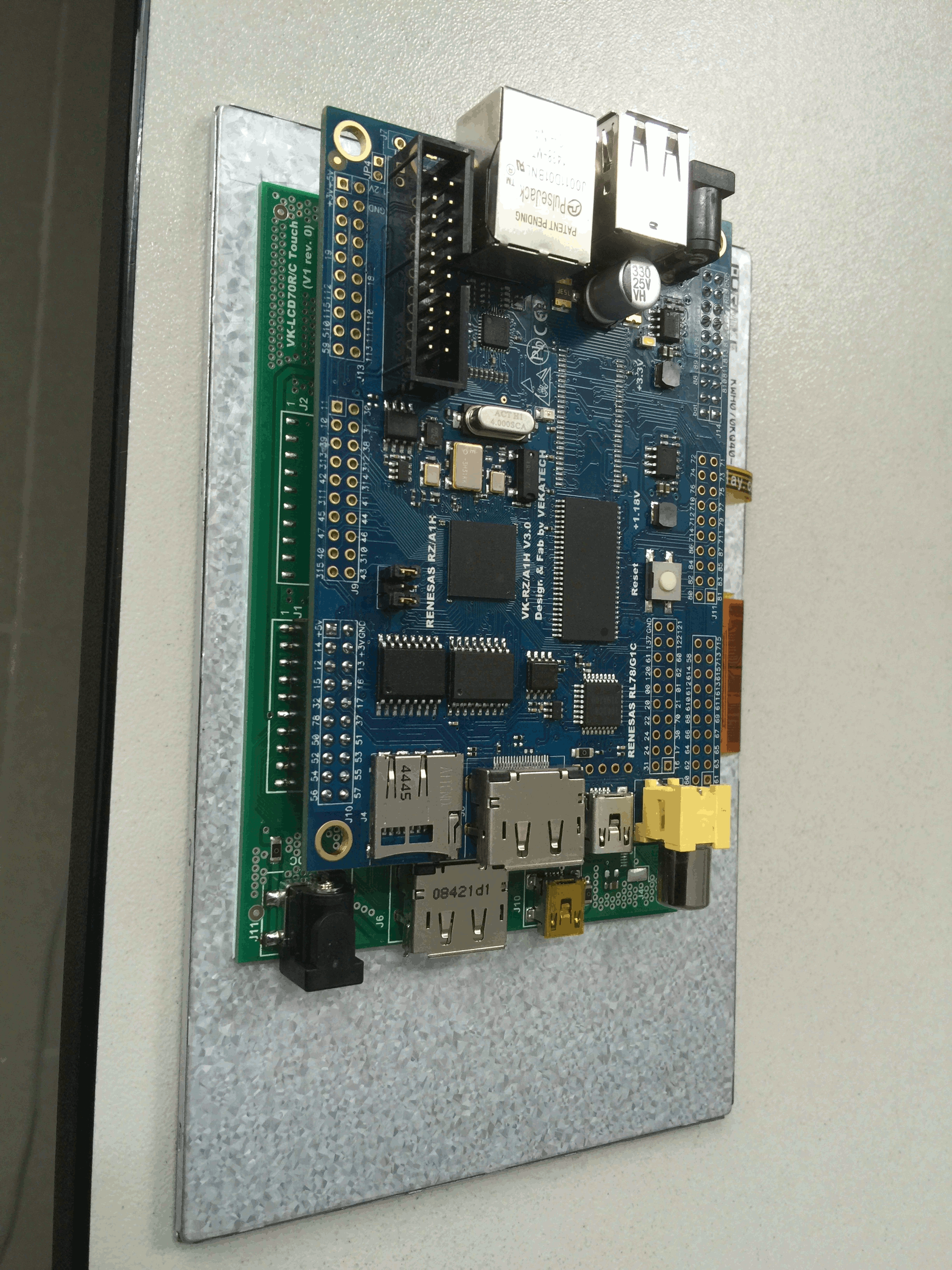
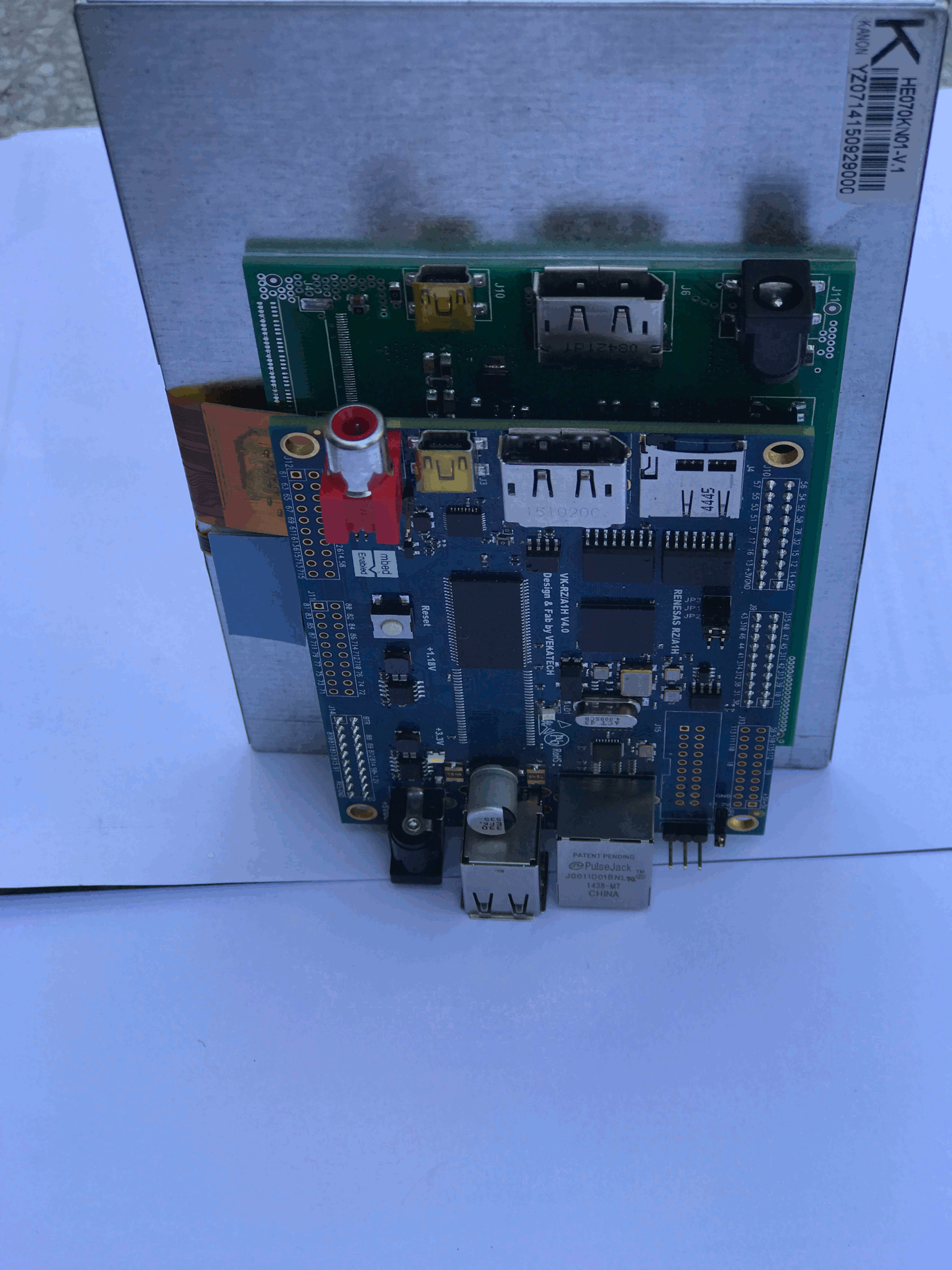
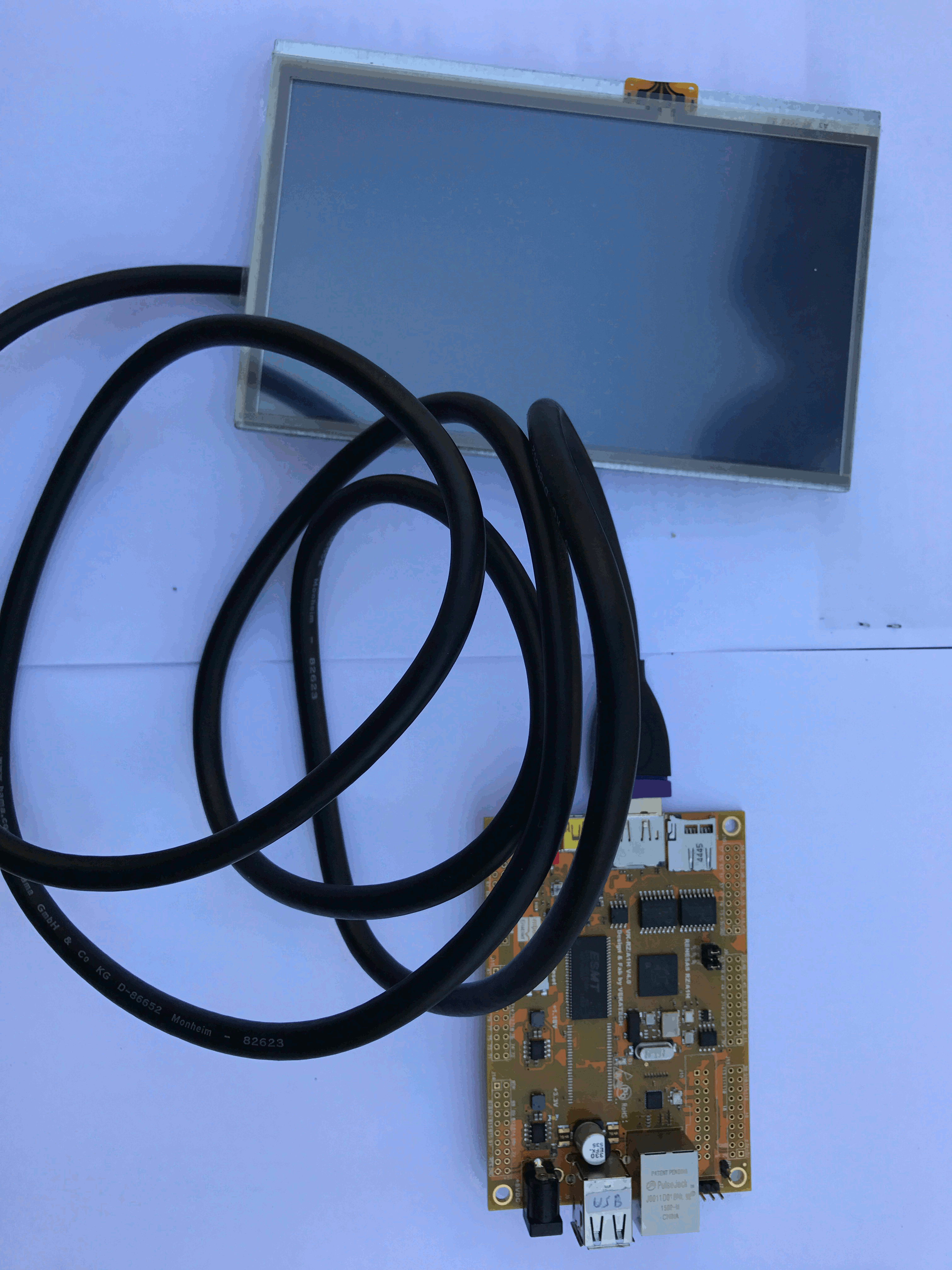
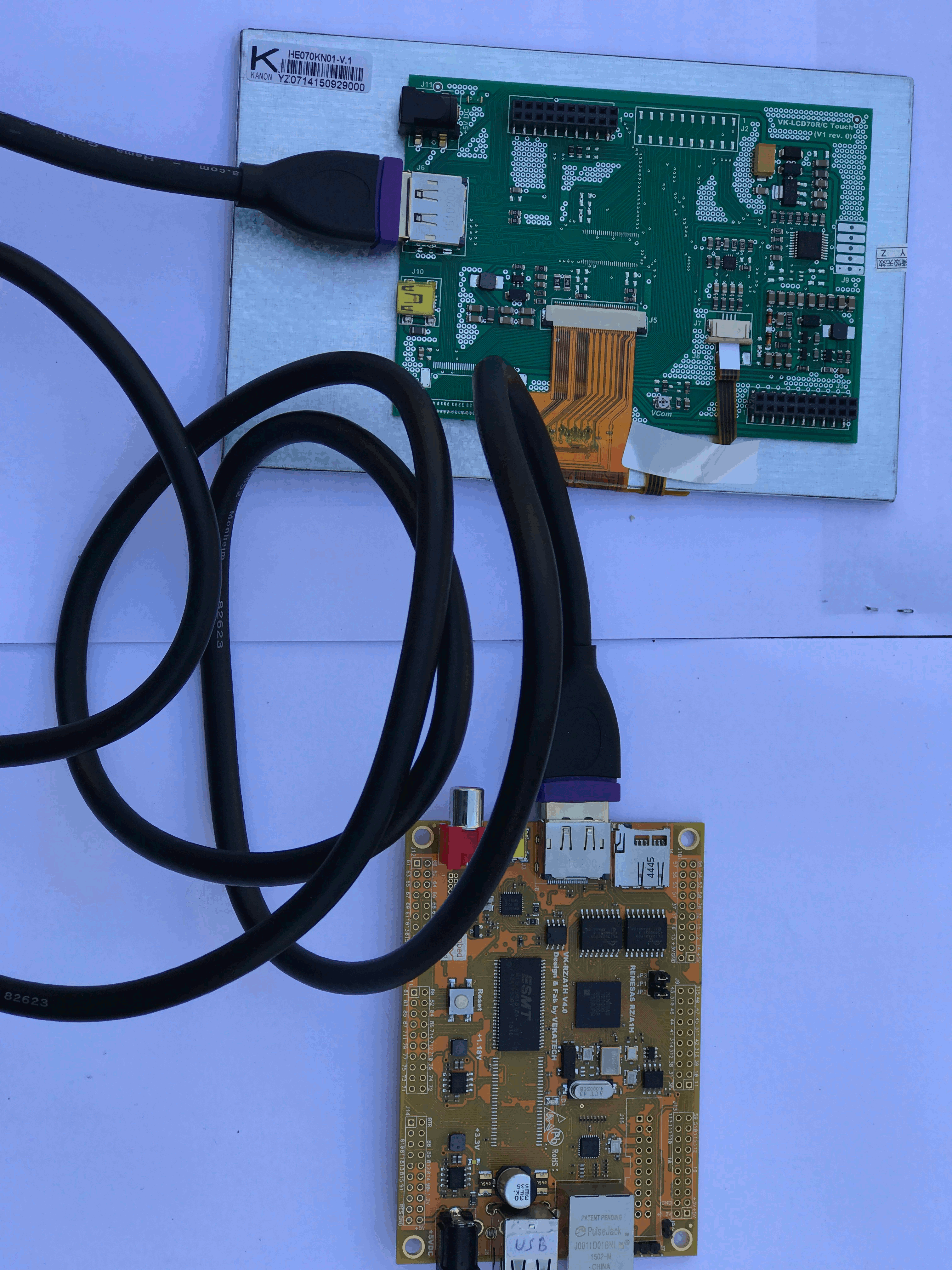
How to Configure ?
You can choose which display is installed by altering the lcd_panel.h file
Leave the active one & comment out the others:
#define LCD_VDC5_CH0_PANEL LCD_CH0_PANEL_VKLCD50RTA //#define LCD_VDC5_CH0_PANEL LCD_CH0_PANEL_VKLCD70RT
You can alter the whole demo with your pictures if you like:
How to compile ?
- The Demo can be compiled in 3 modes:
- I. Execution from the internal 10-MB on-chip SRAM.
- II. Execution from the on-board serial FALSH in dual (32-MB) mode.
- After import in the online compiler just leave only the VKRZA1H_DOUBLE.sct & delete all others linker files in the TOOLCHAIN_ARM_STD folder.
- Drag & drop the result binary in MBED disk, (previously inited in double flash mode)
- III. Execution from the on-board serial FALSH in single (16-MB) mode.
- After import in the online compiler just leave only the VKRZA1H_SINGLE.sct & delete all others linker files in the TOOLCHAIN_ARM_STD folder.
- Drag & drop the result binary in MBED disk, (previously inited in single flash mode )
Quick presentation:
Other demos ?
More demos you can find on our FTP
USB/USBHostCam/USBHostCam.cpp
- Committer:
- tvendov
- Date:
- 2017-02-16
- Revision:
- 0:6435b67ad23c
File content as of revision 0:6435b67ad23c:
// USBHostCam.cpp
#include "USBHostCam.h"
#include "dbg.h"
//#define CAM_DEBUG 1
#ifdef CAM_DEBUG
#define CAM_DBG(x, ...) std::printf("[%s:%d]"x"\r\n", __PRETTY_FUNCTION__, __LINE__, ##__VA_ARGS__);
#else
#define CAM_DBG(...) while(0);
#endif
// ------------------ HcControl Register ---------------------
#define OR_CONTROL_IE 0x00000008
CamInfo* getCamInfoList(); // CamInfo.cpp
USBHostCam::USBHostCam(uint8_t size, uint8_t option, CamInfo* user_caminfo)
{
CAM_DBG("size: %d, option: %d", size, option);
_caminfo_size = size;
_caminfo_option = option;
if (user_caminfo) {
CamInfoList = user_caminfo;
} else {
CamInfoList = getCamInfoList();
}
clearOnResult();
host = USBHost::getHostInst();
m_isoEp = new IsochronousEp;
init();
}
void USBHostCam::init()
{
CAM_DBG("");
dev_connected = false;
dev = NULL;
cam_intf = -1;
device_found = false;
caminfo_found = false;
}
bool USBHostCam::connected()
{
return dev_connected;
}
bool USBHostCam::plugged()
{
return host->plug_status;
}
bool USBHostCam::connect()
{
if (dev_connected) {
return true;
}
for (uint8_t i = 0; i < MAX_DEVICE_CONNECTED; i++) {
if ((dev = host->getDevice(i)) != NULL) {
CAM_DBG("Trying to connect Cam device\r\n");
if(host->enumerate(dev, this)) {
break;
}
if (device_found) {
USB_INFO("New Cam: %s device: VID:%04x PID:%04x [dev: %p - intf: %d]", caminfo->name, dev->getVid(), dev->getPid(), dev, cam_intf);
dev->setName(caminfo->name, cam_intf);
host->registerDriver(dev, cam_intf, this, &USBHostCam::onDisconnect);
int addr = dev->getAddress();
m_isoEp->init(addr, caminfo->en, caminfo->mps, caminfo->frameCount, caminfo->queueLimit);
uint8_t buf[26];
memset(buf, 0, sizeof(buf));
buf[2] = caminfo->formatIndex;
buf[3] = caminfo->frameIndex;
*reinterpret_cast<uint32_t*>(buf+4) = caminfo->interval;
USB_TYPE res = Control(SET_CUR, VS_COMMIT_CONTROL, 1, buf, sizeof(buf));
if (res != USB_TYPE_OK) {
CAM_DBG("SET_CUR VS_COMMIT_CONTROL FAILED");
}
res = setInterfaceAlternate(1, caminfo->if_alt);
if (res != USB_TYPE_OK) {
CAM_DBG("SET_INTERFACE FAILED");
}
for(int i = 0; i < 16; i++) {
report_cc_count[i] = 0;
report_ps_cc_count[i] = 0;
}
dev_connected = true;
return true;
}
}
}
init();
return false;
}
void USBHostCam::onDisconnect()
{
CAM_DBG("dev_connected: %d", dev_connected);
if (dev_connected) {
m_isoEp->disconnect();
init();
}
}
/*virtual*/ void USBHostCam::setVidPid(uint16_t vid, uint16_t pid)
{
CAM_DBG("vid:%04x,pid:%04x", vid, pid);
caminfo = CamInfoList;
while(caminfo->vid != 0) {
if (caminfo->vid == vid && caminfo->pid == pid &&
caminfo->size == _caminfo_size && caminfo->option == _caminfo_option) {
caminfo_found = true;
break;
}
caminfo++;
}
}
/*virtual*/ bool USBHostCam::parseInterface(uint8_t intf_nb, uint8_t intf_class, uint8_t intf_subclass, uint8_t intf_protocol) //Must return true if the interface should be parsed
{
CAM_DBG("intf_nb=%d,intf_class=%02X,intf_subclass=%d,intf_protocol=%d", intf_nb, intf_class, intf_subclass, intf_protocol);
if ((cam_intf == -1) && caminfo_found) {
cam_intf = intf_nb;
device_found = true;
return true;
}
return false;
}
/*virtual*/ bool USBHostCam::useEndpoint(uint8_t intf_nb, ENDPOINT_TYPE type, ENDPOINT_DIRECTION dir) //Must return true if the endpoint will be used
{
CAM_DBG("intf_nb:%d,type:%d,dir:%d",intf_nb, type, dir);
return false;
}
#define SEQ_READ_IDOL 0
#define SEQ_READ_EXEC 1
#define SEQ_READ_DONE 2
int USBHostCam::readJPEG(uint8_t* buf, int size, int timeout_ms) {
_buf = buf;
_pos = 0;
_size = size;
_seq = SEQ_READ_IDOL;
setOnResult(this, &USBHostCam::callback_motion_jpeg);
Timer timeout_t;
timeout_t.reset();
timeout_t.start();
while(timeout_t.read_ms() < timeout_ms && _seq != SEQ_READ_DONE && connected()) {
poll();
Thread::wait(1);
}
return _pos;
}
/* virtual */ void USBHostCam::outputJPEG(uint8_t c, int status) { // from decodeMJPEG
if (_seq == SEQ_READ_IDOL) {
if (status == JPEG_START) {
_pos = 0;
_seq = SEQ_READ_EXEC;
}
}
if (_seq == SEQ_READ_EXEC) {
if (_pos < _size) {
_buf[_pos++] = c;
}
if (status == JPEG_END) {
_seq = SEQ_READ_DONE;
}
}
}
void USBHostCam::callback_motion_jpeg(uint16_t frame, uint8_t* buf, int len) {
inputPacket(buf, len);
}